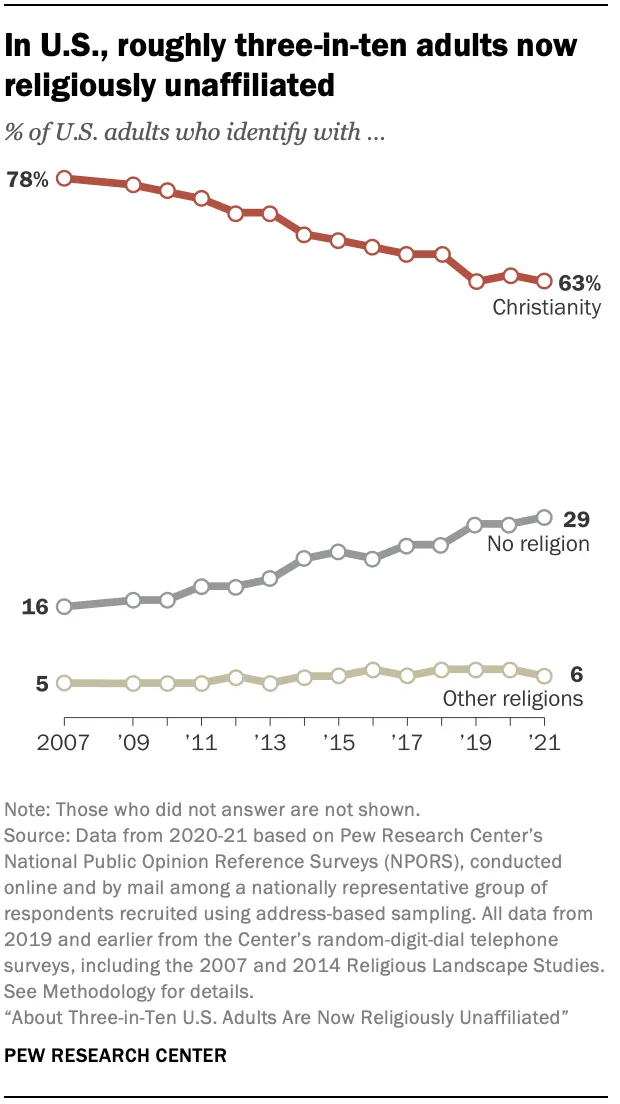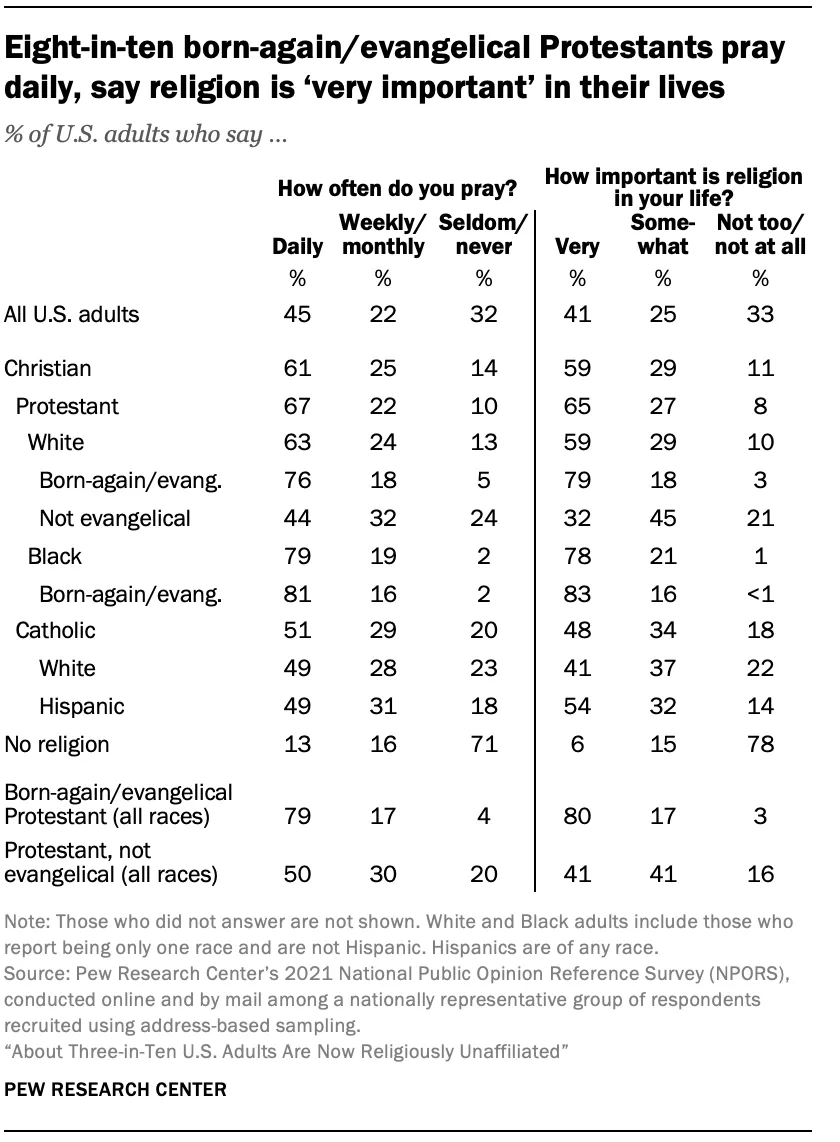
Boston, Mass., Dec 16, 2021 / 17:44 pm (CNA).
A new survey of U.S. adults found that 51% of Catholics pray every day, down from 59% from 2014. Meanwhile, the portion of Americans with no religious affiliation continues to rise.
Those are some of the highlights of a new Pew Research Center survey, which focuses on changes in the U.S. religious landscape. The responses show that much of America is still religious, but significantly less than it once was.
All of America’s religions have recorded downward trends in various categories — except for the “nones.”
The “nones,” a group that includes atheists, agnostics, and those identifying as nothing in particular, now make up almost 30% of the population, up from 23% in 2016. In 2011 they stood at 19%.

While the “nones” grow, Christians shrink. Currently, the Christian population, which includes Catholics, Protestants, the Church of Jesus Christ of Latter-Day Saints, and Orthodox, makes up 63% of the overall U.S. population, Pew reported.
While the Protestant share of the population has experienced a decline of 10 percentage points over the past 10 years, those identifying as Catholic have remained “relatively steady,” the survey found.
In 2021, 21% of U.S. adults identify as Catholic. The Catholic share of the U.S. population, which had been in decline since 2007, is now back up to where it was in 2014, Pew found.
1 in 5 Catholics don’t pray regularly
While 20% of Catholics say they don’t pray or seldom pray, the other 80% pray more regularly.
Although just 51% of Catholics pray every day, 29% reported praying weekly or monthly, Pew found. Much of that prayer must be happening at home or somewhere else each week, though, because only 26% of Catholics report attending religious services at least once a week.
By comparison, 61% of Protestants reported praying every day, while 22% say they pray weekly or monthly. Only 10% of Protestants seldom or never pray.
A little less than 10% of Catholics attend religious services once or twice a month. That leaves the far majority of Catholics, 65%, only attending religious services a few times a year or less. While the majority are infrequent attendees, only 14% of Catholics said they “never” attend.

Rating the importance of religion
Religion is very important in the lives of 48% of Catholics, the survey found. That’s down by 10 percentage points from 2014.
A little more than 3 in 10 Catholics say religion is somewhat important to them, identical to the number in 2007.
For almost one-fifth of Catholics today, religion is not too important or not at all important, Pew’s survey shows. That’s up from 10% in 2014.
Protestants regard religion as more important in their lives than Catholics, the survey found. Sixty-five percent of Protestants reported religion being very important in their lives compared to 48% of Catholics. Catholics who said religion was somewhat important in their life numbered 34%, just 7% more than Protestants, according to the survey.
Only 8% of Protestants said religion was not too important or not at all important in their lives. Eighteen percent of Catholics said the same thing.
‘Nones’ pray, too
A little more than 1 in 10 “nones” say they pray on a daily basis, the survey found.
Although 71% of “nones” seldom or never pray, 13% are praying daily, and 16% pray weekly or monthly.
Not only has the size of the “nones” group increased, but every subgroup within that population has grown, as well.
In 2007, 2% were atheist, 2% were agnostic, and 12% identified as “nothing in particular.” Today, 4% are atheist, 5% are agnostic, and 20% identify as nothing in particular.
Decline in daily prayer
Less than half (45%) of Americans pray on a daily basis. That’s down 10% from 2014 and 13% from 2007.
A little more than one-fifth of adults pray weekly or monthly, the same as recorded in 2007. Still, the portion of Americans who say they seldom or never pray has risen from 14% in 2007 to nearly one-third (32%) today.
A quarter of Americans are attending religious services once a week, while just 7% attend once or twice a month. In 2007, 54% of Americans were attending religious services monthly or more, the survey found.
Most Americans, 68%, attend religious services a few times a year or less. Twenty-seven percent say they never attend.
If you value the news and views Catholic World Report provides, please consider donating to support our efforts. Your contribution will help us continue to make CWR available to all readers worldwide for free, without a subscription. Thank you for your generosity!
Click here for more information on donating to CWR. Click here to sign up for our newsletter.





Aberrant politicians are a real issue here. The scandal this causes laity, and also presbyters, who become conditioned to accepting an apparent status quo of implicit approbation of abortion and the other major moral sins. If the bishops right up to the Vatican hierarchy do not stand by doctrine and the canons going back to Trent on faithful observance, how do we expect the vast majority of Catholics to practice the opposite of this hierarchical accommodation?
+What then? If the Bishops don’t pull together [the majority are pro life and disagree with those politicians] and start the process of counsel, and affirmative declaration of no admittance to the Eucharist for these pols we’ll continue to see the numbers plummet. Only firm, courageous, actually obligatory action can awaken the faith of Catholics and begin the process of reversal [bishops must also take pulpit messaging of their presbyters in hand, insist they address the major moral issues in accord with tradition].
+If the Vatican continues to suppress the ancient liturgy for the Mass, a firm restatement of the faith by the Bishops will demonstrate that this suppressive policy, if liberalizing the faith is their intent, will not succeed.
This must be the New Springtime of Vatican II. If half of American Catholic don’t pray, how can they be Catholics? Oh, I see, they don’t need to pray because everyone goes to Heaven and Hell is empty according to Vatican II.
“because everyone goes to Heaven and Hell is empty according to Vatican II.”
Nope. For example, this passage from Lumen Gentium:
And, of course, the Catechism of the Catholic Church, which was a result of Vatican II:
In addition, Carl, Pope Benedicta and Pope Francis have spoken about hell. Benedict XVI said: “when one does not recognize the possibility of hell, of the radical and definitive failure of life, then one does not recognize the possibility and necessity for purification.” And from Pope Francis described hell as being “far away from the Lord for eternity.”
However, millions of Catholics do not hear or read what our Popes say, but they do listen to their parish priests. It is up to the priests to present the “fires” of hell more often during their sermons.
The survey shows that Catholics pray less frequently than other Christians. I wonder if it could be due to the fact that we have been conditioned to say prayers that have been formulated and repetitive. It is very easy for thoughts to wander when reciting prayers in parrot-like fashion. How many of us are aware that prayer takes us into the presence of God with whom we are having a personal conversation? It is this beautiful spiritual experience happening when we pray that needs to be engrained in us. God goes beyond the beautiful words, hymns and incense to see and hear our true expressions within the soul. Catholics, including myself, need to better appreciate prayer.
Carl, excellent comment and teaching. Bishops, priests, deacons and psr teachers need to teach exactly what these two passages spell out. And they need to do it every year.
Thank you, thank you, thank you.